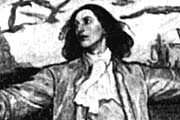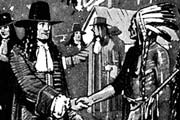Penn's Vision
 |
| A portrait of William Penn calling his Quaker brothers and sisters to settle in a place where they would be free to practice their religion. Image © 2002 www.clipart.com. |
William Penn was the founder of both Pennsylvania and Philadelphia. His vision ultimately made Philadelphia into the drawing card it was.
Born in 1644 in England, Penn early on became interested in religion. As a young man, he heard a talk by Thomas Loe, a missionary for the Society of Friends. The society was commonly known as the Quakers, a name meant to ridicule. The Quakers were a Protestant sect that believed a person's conscience, not the Bible, was the ultimate authority on morals. Quakers had no clergy or churches; instead, they had meeting halls where members came to meditate. They dressed plainly and led a simple life.
In his 20s Penn, who had been trained as a lawyer, became an outspoken Quaker, penning many pamphlets about the religion, which to that point, offered little literature. He spent much time imprisoned in England for his beliefs because they opposed the Catholic/Anglican religious doctrine of the government. One of his trials set a precedent protecting the right to trial by jury.
Certain that religious freedom was impossible in England, Penn in 1681 called on England's ruler, Charles II, to grant land in America to establish a colony. Charles agreed in order to satisfy a debt owed to Penn's father, a famous navy admiral, who had died and left everything to William. The land was approximately today's Pennsylvania and was named in honor of Penn's father.
In 1682 Penn sailed to America and founded Philadelphia, which means "city of brotherly love" in Greek. Penn's First Frame of Government established secure private property, unlimited free enterprise, free press, trial by jury, and religious toleration. It was a precursor to the Declaration of Independence.
Penn's "Holy Experiment," as he called it, quickly became the best hope for persecuted people in Europe. His fair approach also gained him the respect of Indians native to the area. He learned their dialects and negotiated land deals with them, based on peaceful, voluntary exchange, a contrast to other settlers who stole what they could from the Indians.
However, Penn feared that his charter might be lost, so he returned to England to defend the settlement. He soon found himself jailed again in the late 1680s, then was a fugitive for a few more years before having his name restored. However, his experiment never yielded him much in the way of wealth. He died in 1718.
< previous | next > |





